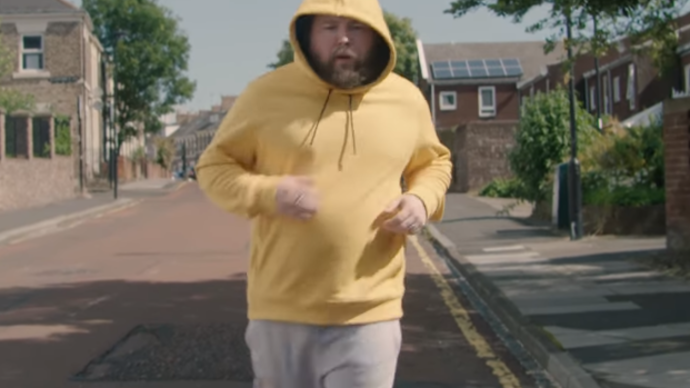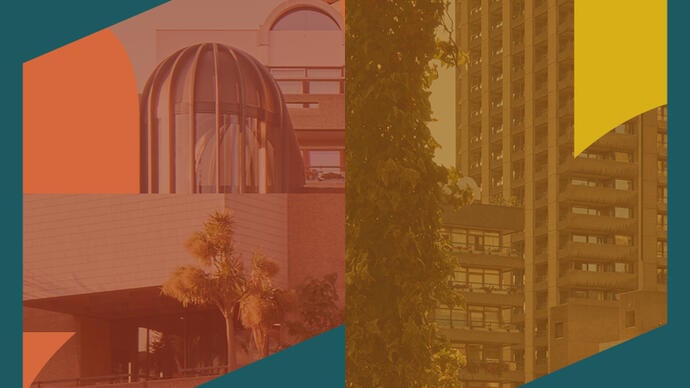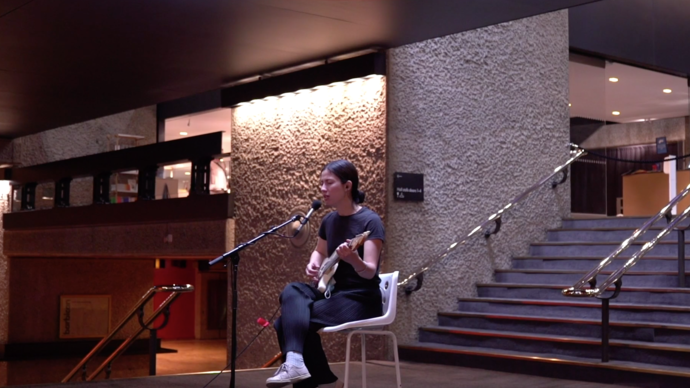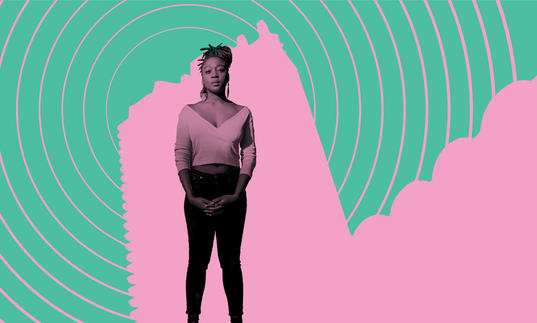Richard Dawson: Live from the Barbican
Doors: 7.15pm
Start time: 8pm
Approximate running time: 60 minutes, no interval
Latecomers to the Hall won't be admitted.
Please note all timings are approximate and subject to change

Richard Dawson talks to Martin Aston about creativity in lockdown and the pertinence of his album 2020.
Just as the UK’s live music scene fell victim to lockdown in March 2020, Richard Dawson was due to perform at the Barbican, an indoor extravaganza of handpicked guests that mirrored the breadth of his interests: Finnish, French and Japanese brands of avant-rock, British electronic pop and progressive folk, Georgian folk and improvised jazz. With that particular line-up to be rescheduled for 2021, Dawson is now performing solo, to a limited audience in the Hall and a live stream, but the show will still incorporate all those disparate elements that make his music a uniquely time-traveling, shape-shifting entity.
Dawson wouldn’t wish it this way, but he admits that playing solo is, ‘more my natural state. I formed bands at school, but otherwise it’s how I started, until I toured my album Peasant (2017) with a band. I really love playing solo, though it’s horrendous as well: you never know what your fingers are going to do! Every album I make, I try and push my technique, so when I play live, I’m a little outside my comfort zone. But I like that too, because mistakes can happen, which makes it more interesting.’
Dawson’s approach to mistakes is part of a sui generis sound and vision that defies the concepts of normality and convenient categorisation. Initially a heavy metal fan, Dawson’s teenage obsession with music led to working in record shops for ten years, which introduced him to a vast range of sounds, radically altering his tastes to experimental and improvised rock and multiple strands of folk music.
Through four albums Dawson developed an elemental and primeval feel to guitar and vocal; angular, ebb-and-flow dynamics, often at length (tracks over ten minutes are common); uncanny tunings, timbres and chords; an often coruscating and direct perspicacity with words that draw on everyday scenarios and intimate revelations. Peasant was Dawson’s great leap forward, both in terms of wider critical and audience recognition, and its epic tales, set between the years AD400-600. Then, in 2019, he released an album he called 2020, with more contemporary tales – a patchwork of joggers and civil servants, Kurdish refugees and UFO enthusiasts, zero-contract workers and empty nesters. In all of them, you could see something of Dawson himself, but also the state of a disunited kingdom.
Not that Dawson wants to align himself with any folk-troubadour tradition, past or present. Asked if the 2020 album represents, ‘an unflinching meditation on contemporary Britain’s psychic crisis?’ as one reviewer heard it, and you can almost hear him shift uneasily in his seat.
‘It’s good to draw attention to the fact we’re in a crisis,’ he begins. ‘But when I did interviews about 2020, I realised I had nothing to add about my music, otherwise it’s just an exercise for my ego. When I’ve spent so much time getting the words right for a song, to toss off words that end up in print can do damage. All I can say is that songs to me are like spells, and they can be very powerful. Rather than think in terms of genre, I place a lot of weight on the song, which is linked strongly with folk music, so I’d say I come from a song place rather than a folk place. I think it’s an important distinction.’
Of course, if the year 2020 was a crisis, what do we call 2021? ‘Not calling the album 2020 would have been helpful!’ he says. ‘But I hope the record is still relevant. The things people are going through are still the same, it’s just that the pandemic has magnified everything. At least, that’s how it’s affected me. My good days are intensely good, and the bad are really bad.’
When lockdown hit, Dawson recalls, he and his partner Sally Pilkington (both current members of the band Hen Ogledd) set up in their dining room, and recorded 49 albums - yes, albums, not just 49 songs - under the band name of Bulbils, all of which are available to download for free (but donate to charities if you can) at their Bandcamp page ‘We tried to make an album a day,’ Dawson says. ‘They’re very simple, lo-fi and ambient. Lots of synths and drones. They’re to help people work, or just relax. For company, or for comfort.’
The early days of lockdown, Dawson recalls, ‘were horrendous, but they had a certain novelty, like an adventure. Come June, when we had some big shows like Glastonbury cancelled, it started to hit home, and the last six weeks have been really rocky. It’s all so ungraspable and unknown. But I’ve been reading a lot, and writing new music, and I’m trying to make a start on the lyrics.’
Dawson’s next album will doubtless be as adventurous, spellbinding and tapestrial as its predecessors. In the meantime, his Barbican show will get him out of the house – and, in line with his embracing of mistakes, he will be dispensing with a set list for the night. ‘Well, maybe I’ll know just the first song!’ he backtracks. But otherwise, I decide as it happens.’
Doors: 7.15pm
Start time: 8pm
Approximate running time: 60 minutes, no interval
Latecomers won't be admitted.
Please note all timings are approximate and subject to change
Performers
Richard Dawson guitar, vocals
Stewart Lee interviewer
Live from the Barbican
Discover

Watch: Richard Dawson - Jogging (Official Music Video)
Folk musician Richard Dawson shares Jogging from forthcoming Domino Records album 2020, which is to be released 11th October 2019.

Listen: Barbican Recommends
Not sure what to listen to? Every month we update our Barbican Recommends Spotify playlist with what we've been listening to in the office. Expect everything from Punk to Jungle to Classical.

Barbican Sessions: Emmy the Great
Emmy The Great brought her guitar along to the Barbican Foyer, to perform ‘Mary’, the first single to be taken from her latest album, April/Yuet Yam.
You might also like

Concerts On Demand
Hall
Location
The Barbican Hall is located within the main Barbican building. Head to Level G and follow the signs to find your seating level.
Address
Barbican Centre
Silk Street, London
EC2Y 8DS
Public transport
The Barbican is widely accessible by bus, tube, train and by foot or bicycle. Plan your journey and find more route information in ‘Your Visit’ or book your car parking space in advance.
We’ve plenty of places for you to relax and replenish, from coffee and cake to wood-fired pizzas and full pre-theatre menus
Mobility
Spaces for wheelchair users in row U at the rear of the stalls (up to sixteen, depth of row 180cm) and the back row of the circle (four), both with fold-down companion seats. Some seats in row S of the stalls for people with very limited mobility.
Assistance dogs
Assistance dogs may be taken into the concert hall where there are a limited number of suitable seats in row G of the stalls. If you prefer, you may leave your dog with a member of the cloakroom staff during the performance.
Hearing facility
There is an induction loop in the concert hall. You can use this by adjusting your hearing aid to the ‘T’ setting.
Free large-print programmes
These are available for most of our concerts. Please contact access@barbican.org.uk at least a week beforehand, to prebook a large-print programmme.
For more access information, please visit our Accessibility section.
Here's what you need to know before you visit.
We're a Covid-secure venue, following all the safety and hygiene measures set out in the government's recent updates, which means we can continue with all our planned activity. This is still the case under the new Tier 2 restrictions in London.
Recently, 95% of Barbican visitors said they felt safe or very safe here. We continue to act upon your feedback to make sure we're offering you the safest and most enjoyable visit.
More safety information can be found here.








